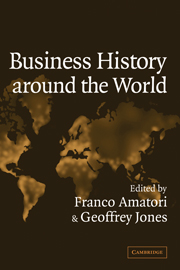Book contents
- Frontmatter
- Contents
- Acknowledgments
- List of Contributors
- Business History around the World
- 1 Introduction
- PART I GENERAL ISSUES, OPEN QUESTIONS, CONTROVERSIES
- 2 Identity and the Boundaries of Business History: An Essay on Consensus and Creativity
- 3 Understanding Innovative Enterprise: Toward the Integration of Economic Theory and Business History
- 4 Productive Alternatives: Flexibility, Governance, and Strategic Choice in Industrial History
- PART II AREA PATTERNS
- PART III COMPARATIVE BUSINESS HISTORY
- Index
- References
4 - Productive Alternatives: Flexibility, Governance, and Strategic Choice in Industrial History
Published online by Cambridge University Press: 24 July 2009
- Frontmatter
- Contents
- Acknowledgments
- List of Contributors
- Business History around the World
- 1 Introduction
- PART I GENERAL ISSUES, OPEN QUESTIONS, CONTROVERSIES
- 2 Identity and the Boundaries of Business History: An Essay on Consensus and Creativity
- 3 Understanding Innovative Enterprise: Toward the Integration of Economic Theory and Business History
- 4 Productive Alternatives: Flexibility, Governance, and Strategic Choice in Industrial History
- PART II AREA PATTERNS
- PART III COMPARATIVE BUSINESS HISTORY
- Index
- References
Summary
The aim of this essay is to present a brief conceptual overview of what has become known as the “historical alternatives” approach to industrial history. The notion of alternatives is central to this approach in both a historical and a historiographical sense. Historically, the hallmark of this approach has been its emphasis on the salience of alternative possibilities, contingency, and strategic choice in the development of modern industry over the past three centuries. Historiographically, this approach represents an alternative to mainstream currents in economic, technological, and business history: an alternative, in particular, to Chandlerian business history, which is focused on the economic and technological efficiency of administrative coordination and learning within large, hierarchically managed enterprises. From its origins in joint work by Charles Sabel and myself in the early 1980s, a substantial body of empirical work on European, American, and Japanese industrial history has since appeared that draws on and extends the historical alternatives approach.
At a more substantive level, the historical alternatives approach allows for the identification of flexibly specialized forms of production in the industrial past. This theoretical possibility, however, should not be confused with empirical claims about the role and importance in particular times and places of flexible specialization as an ideal-typical model of productive efficiency, based on the manufacture of a wide and changing array of customized products in short runs by skilled, adaptable workers using versatile general-purpose machinery.
- Type
- Chapter
- Information
- Business History around the World , pp. 62 - 80Publisher: Cambridge University PressPrint publication year: 2003
References
- 6
- Cited by



